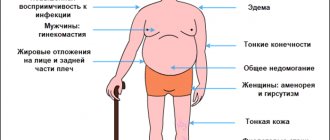Phases of the menstrual cycle and pregnancy
In a healthy woman, the average duration of the menstrual cycle is 28 days, but the norm is considered to be from 21 to 32 days. It is divided into two phases, which are regulated by their hormones. From the first day of menstruation, the follicular phase begins. Its features:
- pituitary hormones stimulate the activity of the ovaries, in one of which a dominant follicle is formed;
- the endometrium separates along with the old, unfertilized egg and comes out with blood;
- then the mucous membrane of the uterus is restored and increases in thickness;
- The hormone estrogen predominates in the body, which promotes the maturation of the egg.
Menstruation lasts on average 5 days, but they can last from 3 to 7 days .
After the maximum rise in estrogen concentration, a peak release of luteinizing hormone occurs, which leads to rupture of the follicle and release of the egg. Regardless of the total duration of the cycle, this occurs on days 11-12. The female reproductive cell has 24 hours to fertilize. If this does not happen, she dies. After the follicle ruptures, the luteal phase of the monthly cycle begins. The corpus luteum forms in the ovaries, which synthesizes progesterone. The hormone is necessary to prepare the endometrium for implantation of a fertilized egg and pregnancy. If there is no sexual intercourse within 24 hours after the release of the egg, it is no longer possible to become pregnant.
Physiology of the monthly cycle
Doctors say that it is impossible to conceive during or immediately after the end of menstruation. But it still turns out that this is possible under certain conditions. A woman's menstrual cycle occurs in three phases (periods). First, one follicle is identified in the ovary. It grows over several days, turning into an egg. When the latter matures, it enters the uterine cavity, ready for fertilization. The maximum chance of getting pregnant is during this period. Typically, it lasts from two to five days.
If fertilization occurs during these days, the luteal phase begins, when the formed embryo attaches to the wall of the uterus and begins to develop and grow. If the egg does not connect with the sperm, it begins to collapse. The surface layer of the uterine mucosa is shed and excreted along with the dead egg during menstruation. Based on this, we can say that the probability of getting pregnant during this period or immediately after menstruation is reduced to zero.
There is a chance of conceiving a child in every month
Being confident that pregnancy cannot occur, women neglect traditional means of contraception. But you should know that you can conceive immediately after the end of menstruation.
Chances of getting pregnant after menstruation
For pregnancy to occur, the following basic conditions are necessary:
- mature egg;
- the presence of sperm in the genital tract or uterus;
- complete endometrium.
Sperm can enter the uterus only during sexual intercourse. They move at high speed: it takes them several minutes to penetrate the uterine cavity. A little more time is needed for them to cover the distance to the fallopian tubes. Fertilization occurs where the egg and sperm meet.
In the vagina, sperm quickly die due to the acidic environment, but in the uterine cavity and tubes, where there is a moist and nutritious environment, they are able to survive for up to 5 days, and according to some studies, especially viable specimens survive for up to 7 days. Therefore, the probability of getting pregnant a week after your period is quite high.
Risks of pregnancy on the 1st day of menstruation
The probability of pregnancy during menstruation is low, which is associated with physiological changes in the uterine cavity and ovaries. In the first 24 hours, a spasm of the spiral arteries occurs, the nutrition of the endometrium is disrupted, and menstruation occurs. Hormones that regulate the menstrual cycle are at minimal levels. Therefore, sex without a condom on the first day of menstruation will not result in pregnancy, after 5-7 days the male cells will die, and at least 5 more days will remain before the follicle ruptures.
Sexual relations during menstruation are practiced by up to 40% of couples who are in long-term relationships. Studies have shown that regular partners do not increase the risk of developing infectious diseases. The role of sex during menstruation in the development of endometriosis has also not been proven.
Whether it is possible to get pregnant on the first day after your period ends depends on its total duration. During regular phases it can be as follows:
- 3 days of menstruation - coitus within 24 hours after the end of menstruation will not lead to pregnancy, 1-2 days remain before ovulation if the sperm survive a week;
- 4-day menstruation - there is a minimal chance of pregnancy, a day or even less remains before the follicle ruptures, with a maximum sperm life of 1 week;
- 5 days of menstruation - there is a minimal chance of pregnancy, which will further increase.
The possibility of getting pregnant immediately after a long period is much higher, but it is less than with coitus just before ovulation.
Probability of pregnancy on day 3
On the 3rd day after the start of menstruation, you can get pregnant if your partner has sufficiently active sperm in large quantities. In men who have sex regularly, every day, the number of germ cells in the ejaculate is less than with infrequent intercourse.
The possibility of developing an ectopic pregnancy also exists , but it is not directly dependent on the day of intimate relations after menstruation. This is a feature of tubal peristalsis, inflammatory changes in the uterus that do not allow the embryo to attach in the right place.
Chances of getting pregnant a week after your period
On the 7th day of the cycle, the chances of getting pregnant increase sharply.
Most girls have completed their menstruation by this time, and there are 5 days left before the reproductive cell matures. Given the ability of sperm to survive, they can wait until the follicle membranes rupture. But it must be borne in mind that not every fertilization results in pregnancy. This requires a full-fledged endometrium, which is ready to accept the embryo. If the embryo lingers in the fallopian tubes and enters the uterine cavity a week after fertilization, it will not be able to attach, which will lead to a biochemical (non-developing) pregnancy and short-term abortion.
It has been established that in healthy women, not every sexual intercourse on dangerous days leads to conception. The percentage of spontaneous pregnancies is approximately 40-45%, and when using IVF this figure does not rise above 35-40%. The greatest chances of conception occur during sex 12 hours before ovulation, the lowest - 5 days before the maturation of the egg.
Myths about sex after conception
Fear of harming the child
Some couples are seriously afraid of touching the child, accidentally poking him, hurting him, or affecting him in some other way. In fact, this is impossible due to the anatomical features of the female body - the child is in the amniotic (fetal bladder), which protects it inside the uterus. The uterus is separated from the vagina by the cervix, which during normal pregnancy is in a closed and relaxed (elongated) state. Even with very deep penetration, the penis cannot reach and touch the child; it always remains only inside the vagina.
Orgasm can cause miscarriage or childbirth
As has been mentioned many times above, in the event of a threat of losing a child, the doctor prescribes sexual rest for the pregnant woman. But if your pregnancy proceeds without pathologies, vaginal contractions will not cause a strong tone of the uterus and will not be able to affect its condition and the health of the child. Orgasm is a good psychological and emotional release for a woman, so experiencing it periodically is even useful - sexual satisfaction contributes to the production of serotonin: the hormone of joy and pleasure.
After conception, a woman's anatomy changes
This myth is also just a fiction. The anatomy of a woman inside the vagina does not depend on pregnancy, so the interesting position does not affect the sensations of the man and the pregnant woman herself. Certain changes occur immediately after childbirth, but the female body is able to recover quickly, and the partner subsequently does not see any difference during sex before and after conception.
You can have sex after conception in certain positions
There are no special positions for having sex after conception. Many couples do not even change their sex life and ways of satisfaction after pregnancy, but continue to enjoy each other as before. The choice of positions is determined solely by the woman’s well-being and comfort: as the tummy grows, one has to give up the missionary position and the cowgirl position, but at the same time, horizons open up for new positions and vivid sensations.
If you have unprotected sex during pregnancy, you can get pregnant again
This myth is the biggest and strangest nonsense among expectant parents. After conception, an embryo has already formed in a woman’s body; after fertilization, the production of eggs and their release will continue for at least a year and a half, so a second pregnancy cannot occur in the uterus. You can safely trust each other and have sex without any methods of contraception, simply enjoying the intimacy and pleasant sensations.
See also: First signs of pregnancy. How to determine pregnancy?
The likelihood of pregnancy immediately after menstruation
You can calculate the probability of pregnancy immediately after your period by its duration. Add 5 or 7 to the number of days with bleeding (sperm life). The ending number must be less than 12:
- 3+7=10 – you can’t get pregnant;
- 4+7=11 – pregnancy is impossible;
- 5+7 = 12 – there is a risk of pregnancy;
- 6+7=13 – probability increases;
- 7+7=14 – the chances of conception are high.
But this rule applies only to girls with regular periods and no hormonal diseases. Otherwise, it is impossible to predict whether there is at least a small risk of becoming pregnant immediately after the end of your period. Ovulation occurs regularly only in healthy women with a normal menstrual cycle.
Pregnancy before ovulation
It is impossible to get pregnant before the oocyte matures , because... no mature egg. But this does not mean that intimate relationships a few days before the phase change are safe. In healthy women, the approach of ovulation can be predicted by the following signs:
- the appearance of mucous discharge from the genital tract;
- the mucus becomes viscous and can stretch into a thread 10-20 cm long;
- Behavior may change and libido increases.
During sex, more lubrication appears, which indicates a high level of estrogen in the blood. After 1-2 days, the follicle may burst, so sexual relations without contraception these days are dangerous.
How long after menstruation can you not use protection?
Couples who have sex during menstruation do not need to use a condom if the bleeding lasts up to 5 days.
After this, there are still 2 days left when you can not use contraception. But later, for your own safety, it is better to use condoms or other contraceptives. In the first days after menstruation, there is already a chance of getting pregnant, although minimal. If contraceptives were not used from day 7 to 12-14 days, then after another 2 weeks a delay in menstruation may appear. But it does not always turn into a full-fledged pregnancy. Sometimes after absence of menstruation, bleeding appears for 1-2 days.
If a woman begins her period after a delay of 1-2 days, she could have a biochemical pregnancy. This is a condition when fertilization has occurred, the hormonal levels have changed, but the embryo was unable to implant or died immediately after attaching to the wall of the uterus. A single case of such pregnancy is not considered a pathology and is not treated.
Safe and dangerous days
A woman with regular periods can independently calculate the days that are safe and dangerous for the onset of an unwanted pregnancy. You cannot have sex without protection 5-7 days before ovulation and a day after it. You can determine the day when the follicle bursts using the symptothermal method (by daily measuring the temperature in the rectum, studying the condition of the cervical mucus and the position of the cervix). The calendar method is also effective, but to use it you need to monitor the menstrual cycle throughout the year.
After stopping hormonal contraceptives, you can get pregnant within a week from the first day of your period. This is called the rebound effect and is used in women with mild forms of infertility. Therefore, the first month of completing contraception using COCs is dangerous due to an increased risk of pregnancy.
Is sex allowed after conception?
Conceiving a child is the best event that can happen to a married couple.
But often good news is the factor that stops any sex after conception. A man is afraid to approach his wife, afraid of damaging something, doing something wrong, or causing pain. In turn, the woman is worried about the condition of the child and is not sure whether she can have sex after conception or should wait until the baby is born. The opinion of Russian obstetricians and gynecologists is unanimous: each case is individual, so it cannot be said with clear certainty that sex after conception is harmful and should be prohibited, or that it is safe and permitted for married couples.
By default, if the pregnancy proceeds without complications, there are no signs of a threatened miscarriage or premature birth, and there are no medical contraindications to sexual intercourse from the doctor managing the woman’s pregnancy, then everything is in order, and you can safely enjoy intimacy with each other. In cases where the health of the pregnant woman or child may be in danger, the doctor himself will warn about the need to maintain sexual rest for a certain period or until delivery.
A woman’s sexual desire depends on the bizarre play of hormones, and during pregnancy it can either increase sharply, reaching its peak, or unexpectedly fall to the very bottom of intimate life. A man should know that the lack of desire to have sex is dictated by complex processes occurring in a woman’s body. It is important to listen to her desires, well-being and mood - otherwise discord may occur in your sex life.
See also: Sports during pregnancy. Which exercises should you do and which should you not?
Opinion of gynecologists
Any girl can figure out on her own whether there is a high probability of getting pregnant before or after her period if she understands that ovulation and a mature egg are necessary for conception. Gynecologists say that already 2 days after ovulation, the percentage chance of pregnancy tends to zero . The female reproductive cell has died, so sperm will not be able to fertilize it. Sex during your period will not lead to conception. This is impossible due to the lack of a complete endometrium and egg.
But we must remember that, in addition to pregnancy, during intimate intercourse without the use of contraceptives, there is a possibility of contracting sexually transmitted infections. Therefore, girls who do not have a regular partner need to use a condom.











